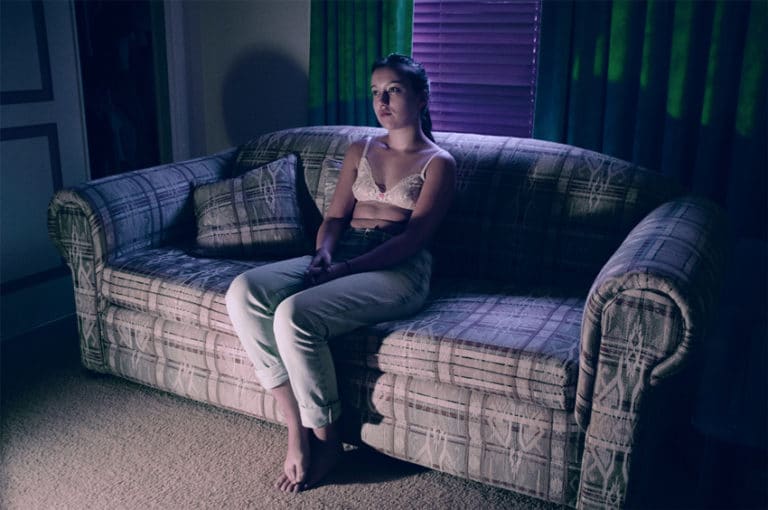Instagram removed posts calling out sexual predators, claiming they ‘violated’ its rules

Last week, the Instagram account @Diet_Prada, notorious for exposing fashion designers knocking each other off, posted a thread revealing photographer Marcus Hyde as a sexual predator. Known for working with the likes of Ariana Grande and Kim Kardashian, Hyde was accused of sexual misconduct by various women—including manipulating up-and-coming models into sending him nudes in exchange for photoshoots.
Model Sunnaya Nash initially posted screenshots on Instagram showing Hyde asking her for nudes in exchange for a photoshoot. When she declined, she received a shocking and aggressive response from him where he said that if she didn’t send him nudes, she would have to pay the $2,000 for the shoot. This inspired numerous women to reach out to her and share the unpleasant experiences they’ve had with the photographer, which she posted on her account. Instagram soon deleted the posts and threatened to delete her account as a violation of their guidelines.
Shortly after, LA-based photographer and art director Haley Bowman called out photographer Timur Emek for pressuring her into sex acts when she was 19. Since sharing her experience, numerous women have messaged her and @Diet_Prada explaining in detail the similar experiences they’ve had with Emek. Somehow, this resulted in Instagram disabling Bowman’s account for 30 hours for ‘violating’ Instagram’s bullying policies and guidelines, once again.
In contrast, just two weeks ago 17 year old Instagram influencer and e-girl Bianca Devins was murdered by a male family friend who shared graphic images of her bloodied corpse on various internet platforms, captioning them with “You’re gonna have to find someone else to orbit”—orbit being a term describing men lurking around a woman with the hopes she will sleep with them. Instagram happened to be one of these platforms. These images were quickly reposted and began circulating across the platform, with Instagram taking no immediate action to take them down.
So why is it that the platform was so quick to remove a post by a woman who called out a sexual assault and predatory behaviour by a powerful man, labelling it as ‘bullying’, and yet was so slow to take down graphic images of a murdered woman who fell victim to this exact same predatory behaviour?
Ironically, platforms like Facebook and Instagram make a profit off of horrific content. Every terrorist recruitment post, every graphic image, every threat of violence means more people become active on the platforms and more revenues are being generated from advertising companies. In Bianca Devins’ case, by keeping these images on the platform, the murderer received recognition—which then led to numerous fake accounts being created by people impersonating him, bringing Instagram more users. Of course, accusing Instagram of attempting to profit off of a young girl’s death is a big allegation, but the question as to why it took so long to delete and flag these images remains unanswered.
Upon regaining access to her account, Haley Bowman went on to say on her Instagram story that she “was being punished for calling out a rapist” by the platform, and made clear that Instagram accusing her of using the platform to ‘bully’ and ‘harass’ photographer Timur Emek is far from palatable, saying, “You can’t harass a rapist by sharing stories of him raping, that’s not harassment – that is the truth”. (Technically speaking, Instagram has a rule to delete all “content that targets private individuals to degrade or shame them”, however, this makes it difficult to find a platform on which these women can share their stories otherwise).
Since then, Instagram disabled both Timur’s and Marcus’s accounts, gave Haley her account back (although, when searching for her Instagram handle via my search engine yesterday, her account wouldn’t show up, despite being live again), and apologised for deleting Sunnaya’s posts, saying they were “deleted in error”. Of course, Instagram only openly admitted it was an error after receiving backlash for silencing Sunnaya in the first place, so whether it was really just an ‘accident’ remains questionable.
Do men and women have the same rights to freedom of expression on Instagram according to its rulebook? The answer is very simple—no. In April, the platform began demoting photos that were deemed ‘inappropriate’ but didn’t actually violate any guidelines. Instagram used its algorithm to put these at the very bottom, while being particularly vague about what it considers inappropriate. Naturally, this includes censoring the female body; we are all acquainted with Instagram’s rule that bans most images of female nipples but not male.
While it might not seem like a big deal, Instagram’s inherent shadowban on what is appropriate and what isn’t is harmful to many. Sex workers who rely on their social media, influencers who make a living of this, and general body and sex-positive pages, models, photographers, artists are all affected by it. Not only is Instagram censoring the female body but it is also impacting some women’s work.
Intentionally or not, Instagram is allowing dangerous men to have a voice on its platform. Of course, in today’s world where everything is so fast and instant, it is easy to forget that people need time to act on an issue, and, yes, Instagram did eventually delete the photographers’ accounts as well as the images of Bianca, but how come when my nipple is slightly showing in a photo or when I post a painting depicting a naked woman, my images instantly get flagged and deleted? Why is there an urgency to silence women but not an urgency to silence rapists and murderers? It certainly feels like there is an agenda here. And Instagram needs to sort its priorities out, quick.




